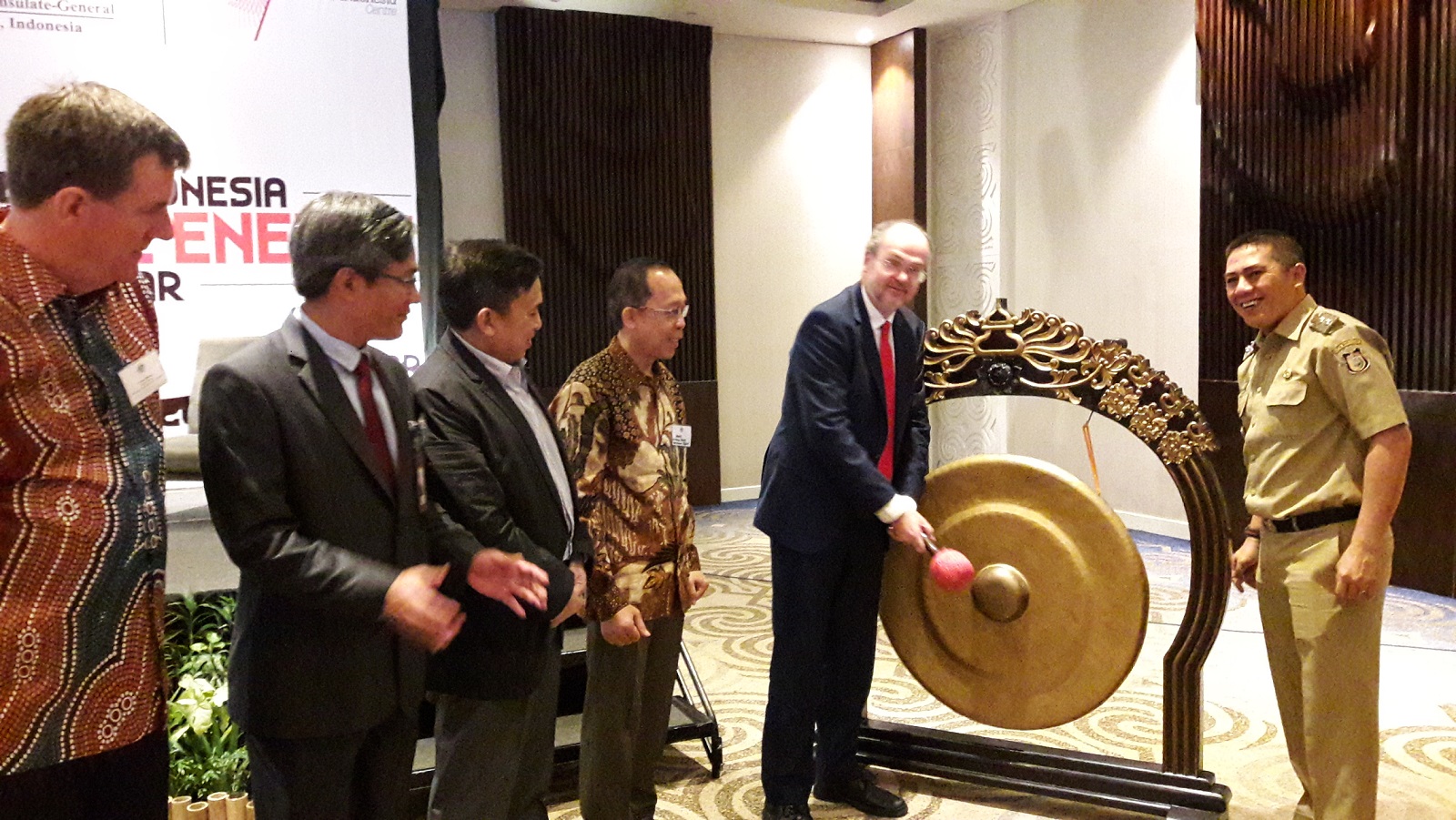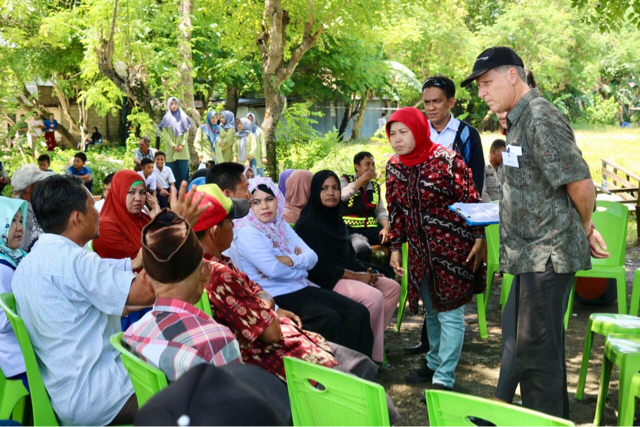Last year at the Australian Consulate-General in Makassar we began looking at the renewable energy sector as an area where we could promote greater bilateral engagement with commercial benefits for Australian businesses, and development benefits for eastern Indonesian communities. This is an area where there will be significant growth: President Joko Widodo has set the goal of adding a massive 35 gigawatts of electric power to the national network over the next few years, and also a renewable energy target of 23 per cent by 2025 - just seven years away. Currently around 8.5 per cent of Indonesia’s energy is drawn from renewable sources.
Australia and eastern Indonesia share similar energy challenges. We both have communities in isolated areas far from the national electricity grid which need electricity; we also have abundant natural resources required for power generation – wind, sunshine, fast rivers, geothermal potential and even wave power potential.
Australia’s first commercial wind power plant was built in Esperance, WA, in 1987, and today over 80 commercial wind power plants are operating across Australia. Indonesia is beginning its entry into commercial wind power, with the first commercial scale wind power plants due to begin operating in South Sulawesi in mid-2018. Commercial scale solar power is also just beginning to take off in Indonesia; Australia may not be leading the world in solar power generation just yet, but we have one of the highest rates of residential rooftop solar power installed in the world.
Indonesia has achieved an impressive electrification rate of over 93 per cent, but many Bupatis (regency heads) and other senior officials across eastern Indonesia have told me that many villages in the islands and mountains have intermittent electricity or no electricity at all. Most isolated districts cannot be connected to the PLN (State electricity provider) grid and rely on expensive diesel-fuelled generators. Bupatis have told me they would be very interested in sustainable long-term solutions to providing electricity to their more isolated communities.
And Australia has this experience: our companies have been providing affordable, reliable energy solutions for isolated bush communities for decades. So in collaboration with the Australia-Indonesia Centre (hosted at Monash University) we formulated a plan to bring experts and investors from Australia’s renewable energy sector to meet counterparts from Indonesia. We would focus on the potential for renewable energy development in the eastern provinces. Recently we realised this ambition: we held the first ever Australia-Indonesia Renewable Energy Field Study and Seminar in Makassar from 26 – 28 March 2018.

Our program consisted of a one day seminar in a leading Makassar hotel followed by two full-day field trips. The seminar was open to invited participants from both countries’ renewable energy sectors. Our opening speakers included the West Australian Minister for Mines and Petroleum and Asian Engagement, the Hon Bill Johnston MLA, whose capacity in Bahasa Indonesia is impressive – he is one of the few Australian politicians to have a good understanding of our largest, nearest neighbour. Our audience in Makassar were highly impressed by his opening remarks in Indonesian, and by his detailed exposition of Western Australia’s capabilities in this sector.
Other key speakers included the former General Manager of PLN for South, Southeast and West Sulawesi, Bob Saril. Bob is a UNSW graduate in electrical engineering and now has moved to take on the challenge of GM PLN for East Java. Representing the private sector was Halim Kalla, the Deputy Chair of Indonesia’s Chamber of Commerce (KADIN) for Renewable Energy. Pak Halim has interests in hydro power in central Sulawesi, and is an advocate for stronger government support for the renewable energy sector. Pak Haris, Director for New and Renewable Energy, Ministry of Mines and Energy, Jakarta, spoke about regulations and national renewable energy policy.
Our invited audience consisted of 39 Australian renewable energy experts from the private sector and academia. We had targeted attendance by an Australian delegation of 30! Our Indonesian participants numbered around 100 experts and activists from around the country, but especially from eastern Indonesia: eight Bupatis or Mayors were in attendance and had good interactions with Australian delegates (we provided free interpreting services). The AIC’s Dr Max Richter and his colleagues led roundtable discussions which resulted in six proposals to develop joint research projects in renewable energy development in eastern Indonesia.
On Day Two our Australian delegation travelled two hours south of Makassar (with full police escort, sirens blaring!) to tour the Equis Energy 72 megawatt wind power plant being developed in Jeneponto regency. This project has strong Australian connections: it was started with Australian investor funds, and the General Manager and Construction Manager are Australians. Participants were impressed by the scale of this project, how quickly Equis have brought it off, and how they have conquered the engineering challenges and built up good local community relations.
The Bupati of Jeneponto also led a group discussion with our Aussie delegation about how the local regency government had facilitated the complex process of permits and licences. They are also beginning to plan a tourism industry based on guided tours of Indonesia’s first commercial wind power plant: viewing points have already been identified for visitors to take photographs and selfies of some of the 20 massive windmills that will be completed by mid-2018.
On Day Three we faced a logistical challenge: getting 30 Australians safely across the sea to Salemo Island in the Makassar Strait to view a PLN 150 Kv solar power plant, and have a discussion with the local community about the pluses and minuses of solar power on an isolated island. We need not have worried about our journey across the Straits: the sea was as flat as glass, and we were escorted by a large police contingent from the Pangkep regency. The boats we hired for the journey all had life jackets.
I have written about a previous visit to Salemo Island (http://makassar.consulate.gov.au/mksr/Blog_21.html), and have now visited the island four times. It is a fascinating pace and the islanders are getting used to seeing “Pak KonJen” in their community.
Our Australian delegation toured the PLN solar PV plant, then joined a community discussion led by the AIC’s Dr Max Richter, and Ibu Tri Mumpuni. Ibu Tri is a renewable energy activist and founder of one of Indonesia’s largest social business enterprises, IBEKA (http://3.ibeka.or.id/wp/index.php/en/home/ ).
Sitting under the trees on the edge of the island, with children running around, police and officials milling about smoking and eating, I watched the discussion and was proud we had made it happen. This was genuine engagement. Islanders were telling the Australians that they were not so worried about the source of the energy, they just wanted a reliable and sufficient supply. They made a living mainly from seaweed and fish. But they would like a better means of drying the seaweed – currently they only have the sun. They would also like to add value rather than just sell dried seaweed to mainland collectors. Couldn’t electricity from solar power help provide a solution? Fishermen also complained they could never get enough ice: couldn’t solar power help?

These sort of questions energised the development specialists among our Australian group who voiced a number of potential solutions. I expect some among our Australian delegation will come back to Salemo Island and try their ideas, working with the local community. These outcomes may then benefit many of the other 80 populated islands of the Spermonde Archipelago, off South Sulawesi’s west coast.
Highlights
Over the three days of this event there were many memorable occasions. One was the Bupati of Jeneponto espousing the benefits of eating horse meat for men: it gives you “special energy” (Jeneponto is famous for its horse meat culinary tradition). I responded that I had tried horse meat but that it didn’t work: perhaps I was too old. This exchange was reported in the local papers the next day! Fortunately the local papers did not report that I sang a very poor rendition of the famous Iwan Fals pop song “Bento” at our delegation dinner: the song is about how Bento, a small-time criminal, enjoys getting rich from his shady dealings and getting away with it: Asyik!
Another highlight was lunch on Salemo Island in the village headman’s house. Our delegates discovered that they all had to sit in a row on the floor, and take food from abundant dishes before them. I am sure some had not sat cross-legged for years! But to their credit all enjoyed themselves – and the local dishes were delicious. The local crab, while messy and difficult to eat, was worth it.
But perhaps the greatest memory of all was the warm welcome we received from everyone in Jeneponto and on Salemo Island. We will all remember the genuine friendliness of these country folk.
Future Outcomes
According to a survey of our Australian participants, all are planning future projects as a result of this seminar and field study: 69 per cent are business projects, and 31 per cent are academic/research projects.
We also are organising an Australian Awards short course on Renewable Energy: Technology and Policy, which will take 25 Indonesian government and private sector participants from eastern Indonesia to Australia for two weeks of seminars, field visits and discussions, in August this year. In May we will hold a three day pre-course workshop for participants in Makassar. Several of our Australian delegation renewable energy experts have agreed to be mentors for our Indonesian course participants.
The renewable energy field study and seminar was an organisational and policy challenge for our small team at the Australian Consulate-General in Makassar. We were fortunate to work with the Australia-Indonesian Centre, and have the support of some excellent speakers. The mix of business and academic experts, and the seminar-roundtable-field study format worked well. And I was impressed with the enthusiasm and commitment of our Australian participants, who took the time to travel to Makassar.
***
